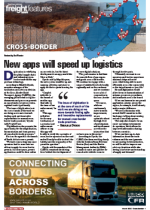Delays and congestion at border posts continue to be a stumbling block for cross-border trade.Addressing the numerous non-tariff barriers that exist in southern Africa is just as important. According to Sibulele Dyodo, executive manager of the facilitation and advisory division at the Cross-Border Road Transport Agency (C-BRTA), the African Continental Free Trade Area (AfCFTA) brings major opportunities for African trade, but it will require a concerted effort from all countries to harmonise systems and improve infrastructure.“The delays and congestion as well as the lack of standardisation of cross-border procedures drive up the cost. South African operators continue to face very high costs of doing business. Much of that is due to the many fees and payments that are introduced by the respective countries for cross-border movements. We must level the playing field,” he said.Speaking to Freight News, Dyodo explained that unless the cost of doing business was reduced, volumes would never grow to the extent that was possible.“We see South African operators paying more and more. The third-party motor vehicle insurance requirements are hefty. Then there are different regulatory regimes to contend with. It is not an easy operating environment.”Dyodo said the AfCFTA was an exciting development that offered a very real opportunity for African trade to grow. “At the core, however, of this is the need to harmonise the regulatory regimes of countries. If we continue to work in silos, we are not going to see the success we are striving to achieve. “It is only through harmonisation that we will see the seamless movement of cargo from one country to the other.”He said the existing Tripartite Free Trade Area involving Comesa, the EAC and SADC had proposed regulatory regimes that promoted harmonisations. “There are two agreements that need to be signed that speak to improved harmonisation,” he said. “The multilateral cross-border road transport agreement and a vehicle load management agreement will go a long way in assisting with harmonisation efforts.”Dyodo told Freight News that digitising procedures was also an important step on the path to online information sharing among border agencies and countries.“In SADC we are seeing volumes pick up, particularly in terms of East Africa. We have seen an increase in permit applications for East Africa and are at present issuing these even as far as Uganda.”Another corridor seeing growth was that of South Africa to Mozambique. “The Lebombo border post has seen a major increase in traffic. We are looking at present at around 1 600 trucks per day going through this border post. It has also seen its fair share of congestion.”He said stimulating intra-African trade throughout the continent would require the ability to fast-track administrative processes, while cross-border trade procedures would have to be simplified.“We must have robust linkages within the continent in terms of infrastructure to make it easy for these trucks to move over these long distances across several countries.“If we look at Europe, as an example, and how cargo f lows freely between countries in the European Union, then it becomes clear we need to move faster. “We need to look at a regional or even a continental structure much like the EU Parliament that can develop policies and promulgate laws that are compulsory for countries rather than depending on each country to implement change as and when they can.”For Dyodo it is also important to move towards total liberalisation of the freight market in Africa. “Again, looking at Europe, there are no borders at all, and cargo moves seamlessly across the continent. We still have the third-country rule prohibiting our movement, so we need to aspire to see cargo f low more freely. It is going to require a lot of work and time, but I believe we can get there if we all work together.”Dyodo said another important development was the increased focus on the environment. “Green solutions are important. “We are seeing a growing demand that products are only going to be purchased if the transporters are adhering to environmental prescripts. “The continent must move towards ensuring we are implementing green transport solutions. It is an important element to keep track of in the cross-border space.

